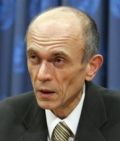Slovenian president promotes Darfur peace initiative
Jan 18, 2006 (UNITED NATIONS) — Slovenian President Janez Drnovsek came to the United Nations Wednesday to promote his peace initiative for Sudan’s troubled Darfur region, proposing an international peace conference and urging citizens to pressure their governments to take action.
 He called on the U.N. Security Council to step up its involvement in the region, where an estimated 180,000 people have died and about 2 million have been displaced since conflict erupted between ethnic African tribes and government-supported Arab militias in 2003.
He called on the U.N. Security Council to step up its involvement in the region, where an estimated 180,000 people have died and about 2 million have been displaced since conflict erupted between ethnic African tribes and government-supported Arab militias in 2003.
Drnovsek singled out China and the United States as countries he thinks could be key players in ending what many countries have labeled genocide in Darfur.
China, which has a large economic presence in Sudan, “should use their leverage there and join in this effort in the right way,” he said.
Drnovsek spoke to reporters after meeting U.N. Secretary-General Kofi Annan who has made frequent calls for a “durable political peace” and a permanent cease-fire in Sudan.
Drnovsek recently suggested that his country establish a camp in Sudan for 10,000 refugees, and said Slovenia had also offered to set up a field hospital and send land-mine clearing experts to the region.
“I think there’s undoubtedly a larger role the international community can play both in helping us provide security in the Darfur region and in terms of humanitarian assistance,” U.S. Ambassador John Bolton said when asked about the potential effectiveness of Drnovsek’s proposals.
The president’s visit to the U.S. was part of a multination consciousness-raising effort, an initiative he has dubbed, “The World for Darfur.”
Drnovsek acknowledged his country had no special interest in Sudan, but said he felt compelled to address the humanitarian crisis in Darfur because of “the power of connections between all people.”
He said he also planned to visit Sudan in February and was waiting to hear back about a visit to neighboring Chad, which has taken in some 200,000 refugees from the two-year Darfur conflict.
(AP/ST)
